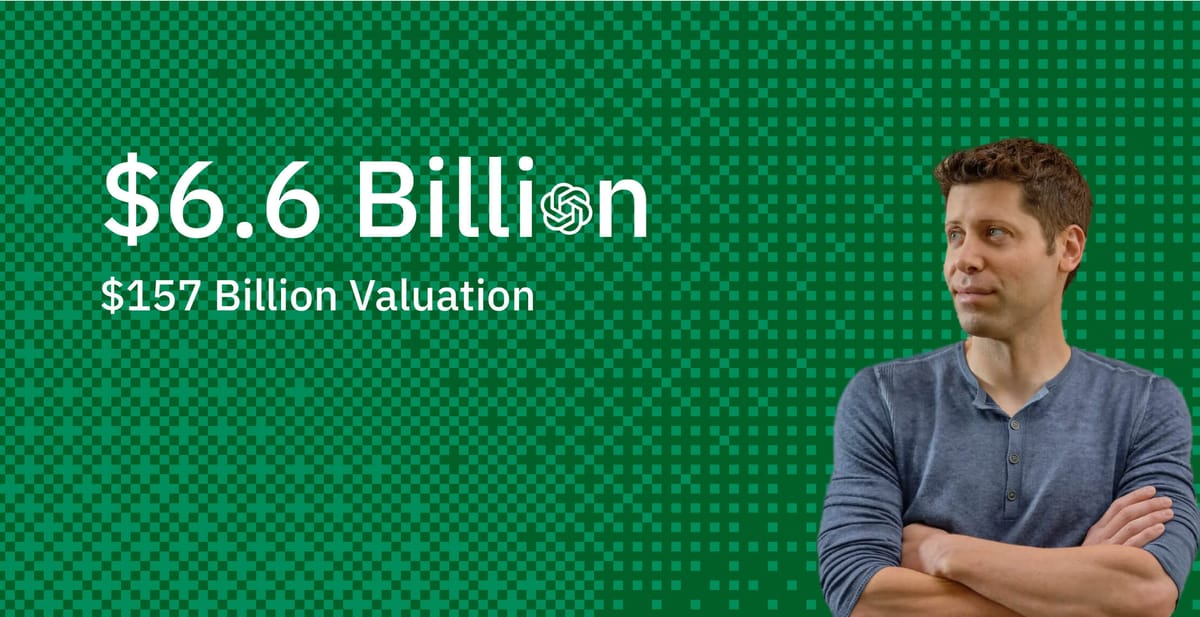
OpenAI has raised $6.6 billion in a landmark funding round, valuing the AI powerhouse at $157 billion. This deal, announced on Wednesday, marks the largest venture capital investment in history and more than doubles the company's valuation from just nine months ago.
Thrive Capital led the round, investing about $1.3 billion, with participation from tech giants Microsoft and NVIDIA, as well as SoftBank, Khosla Ventures, Altimeter Capital, Fidelity, Tiger Global, and the United Arab Emirates investment firm MGX. Notably, Thrive Capital has secured an exclusive option to invest up to an additional $1 billion at the same valuation through 2025.
The massive influx of capital comes as OpenAI experiences explosive growth. The company now boasts about 1,700 employees, having added more than 1,000 workers in just nine months. ChatGPT, its flagship product, has surged to over 250 million weekly active users.
The company’s financial trajectory is staggering. OpenAI is expected to generate $3.7 billion in revenue this year, with projections for that number to rise to $11.6 billion by 2025. However, high costs remain a challenge. OpenAI is expected to lose about $5 billion in 2024 due to the immense costs of training and running AI models like ChatGPT, which reportedly costs the company $700,000 per day just to operate. To date, the company has spent an estimated $7 billion on model training and another $1.5 billion on staffing.
"The new funding will allow us to double down on our leadership in frontier AI research, increase compute capacity, and continue building tools that help people solve hard problems," OpenAI said in a blog post announcing the funding.
In a letter to employees, Chief Financial Officer Sarah Friar, also shared plans for a tender offer, that will allow some employees to sell some of their stakes in the company. However she noted that the details and timing were still being finalized.
OpenAI’s complex governance structure has also been a source of tension. Founded as a nonprofit in 2015, OpenAI was transformed into a capped-profit entity by Altman to raise the billions required for cutting-edge AI research. The nonprofit structure still governs the company, though there are growing calls for a shift to a full for-profit model. Under the terms of the recent fundraising deal, OpenAI has two years to complete this transformation, or its funding could convert into debt.
Over the last week, OpenAI has seen the departure of several high-profile executives and researchers, including CTO Mira Murati and research chief Bob McGrew. The timing of these exits has raised questions about potential internal conflicts over the company's direction and the balance between rapid advancement and AI safety concerns.
Despite its leadership in the space, OpenAI faces increasing competition from rivals like Anthropic, xAI, Google and Meta—who all have differing approaches and advantages. Anthropic has focused on its constitutional AI and other safety principles with Claude, xAI's Grok has real time access to all content on X, Google's Gemini has the largest context window, and Meta is championing actual open AI with Llama.
Microsoft remains one of OpenAI’s most crucial partners, having invested over $13 billion into the company and built an entire suite of AI-driven productivity tools on top of OpenAI models. The two companies are also working closely on integrating AI tools into cloud services, a partnership that has bolstered Microsoft’s position in the enterprise space.

